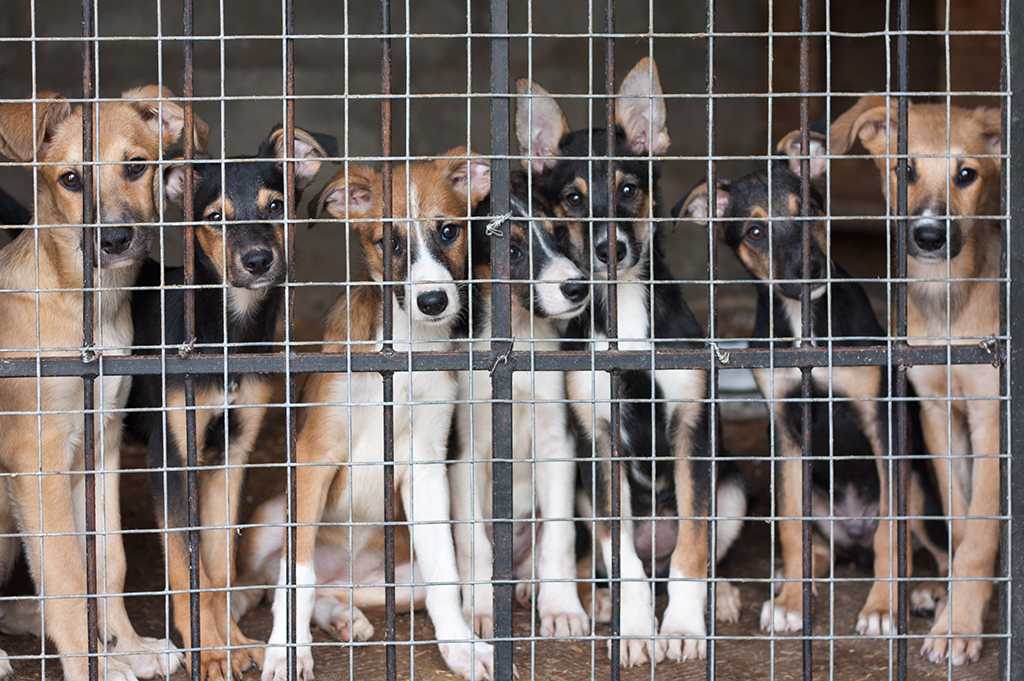Last year, Lucy’s Law was passed, banning the sale of kittens and puppies from third parties. On April 6th 2020, Lucy’s Law came into effect, named after a Cavalier King Charles Spaniel, Lucy, who died in 2016 after being kept in terrible conditions on a puppy farm in Wales. Here’s everything you need to know about the new legislation, and how it might affect the breeding, buying and selling of puppies going forward.
What changes with Lucy’s Law?

The new legislation bans the sale of puppies and kittens under six months old from third-party sellers. You’re still okay to buy directly from the breeder; a third-party seller refers to any individual or establishment selling pets they did not breed, like pet shops or commercial dealers.
Lucy’s Law: an end to puppy farms?
The aim of Lucy’s Law is to help put an end to puppy farms, where dogs are subject to terrible conditions. One dog can be forced to produce multiple litters one after the other until she is physically unable to have puppies, putting a huge strain on their bodies. The puppies are often separated from their mothers just weeks after birth too, leading to health and socialisation issues that could last a lifetime.
How will new legislation affect puppy farming?
A ban on third-party sales is an essential first step in putting an end to puppy farming. The new legislation aims to cut off a vital line of profit from the puppy farms. Cutting out the middleman in the sales process means buyers will have to deal directly with the breeder, and will be able to see first-hand the conditions in which the puppies have been raised.
What does Lucy’s Law mean for the buyer?

If you’re looking to buy a new puppy, then not much should change for you. The buying process should still be the same as any other time that you’d buy a pet from a breeder. The only difference will be the availability of the pets. You won’t be able to buy puppies from pet shops or other commercial sellers; you should always be dealing directly with breeders.
What to look for when buying a puppy
Unfortunately, despite the new law coming into effect, puppy farms will still likely continue to exist, and try to make a profit from over-breeding their dogs. Here are some ways that you might be able to spot a puppy farm:
Always ask to see the mother
When you go to see your potential new puppy, always ask to see the mother. Not being allowed to see the mother is a huge red flag, and a sign that the breeders could be running a puppy farm. Some disreputable sellers might even have a healthy dog posing as the mother, so always look at how the dog interacts with the puppies; they should have developed a deep bond.
See the whole litter and where they were born
Even if the rest of the puppies are reserved, you’ll want to see the whole litter and, again, how the pups interact with their mother. Only being allowed to see one puppy at a time could be a sign that something isn’t right. Don’t meet in a public place, either, as you should want to see the conditions in which these puppies were bred and raised.
Do the puppies look healthy and happy?
There are a few things to look out for when choosing a healthy puppy:
– A clean, shiny coat
– Clear eyes
– A moist but not runny nose
Puppies should also be lively and energetic. Obviously, this can vary between each individual dog, and some may be more shy than others, but they should all appear alert, interested in their environment, and happy.
What should you do if you discover a puppy farm?

If you believe you’ve come across a puppy farm or an unlicensed breeder, you should always tell the relevant authorities. Contact either the RSPCA or the local police with details of the seller, and they should be able to take the appropriate action. To help prevent pets from being bred in poor conditions, the UK government has launched the Petfished campaign, helping potential new pet owners to find reputable breeders.
If you’re looking to introduce a new puppy to the family, we’d always recommend doing your research, and finding a reputable breeder. You also might want to think about insurance for your puppy*. At The Insurance Emporium, our Dog Insurance can include Standard Benefits, like cover for Vet’s Fees up to £8,000^. You could even receive up to 30% discount†! Head on down to The Insurance Emporium to find out more!
* Pet Insurance from The Insurance Emporium is available for puppies aged from 5 weeks old.
^ Vet’s Fees cover up to £8,000 available on lunar and calendar monthly Lifetime Gold policies.
† The 30% discount is made up of 20% Introductory Discount plus 10% Multi-pet Discount (if appropriate). The Introductory discount is available for the first 12 premium payments on lunar and calendar monthly policies or one premium payment on annual policies.
All content provided on this blog is for informational purposes only. We make no representations as to the accuracy or completeness of any information on this site or found by following any link on this site. We will not be liable for any errors or omissions in this information nor for the availability of this information. We will not be liable for any loss, injury or damage arising from the display or use of this information. This policy is subject to change at any time.


